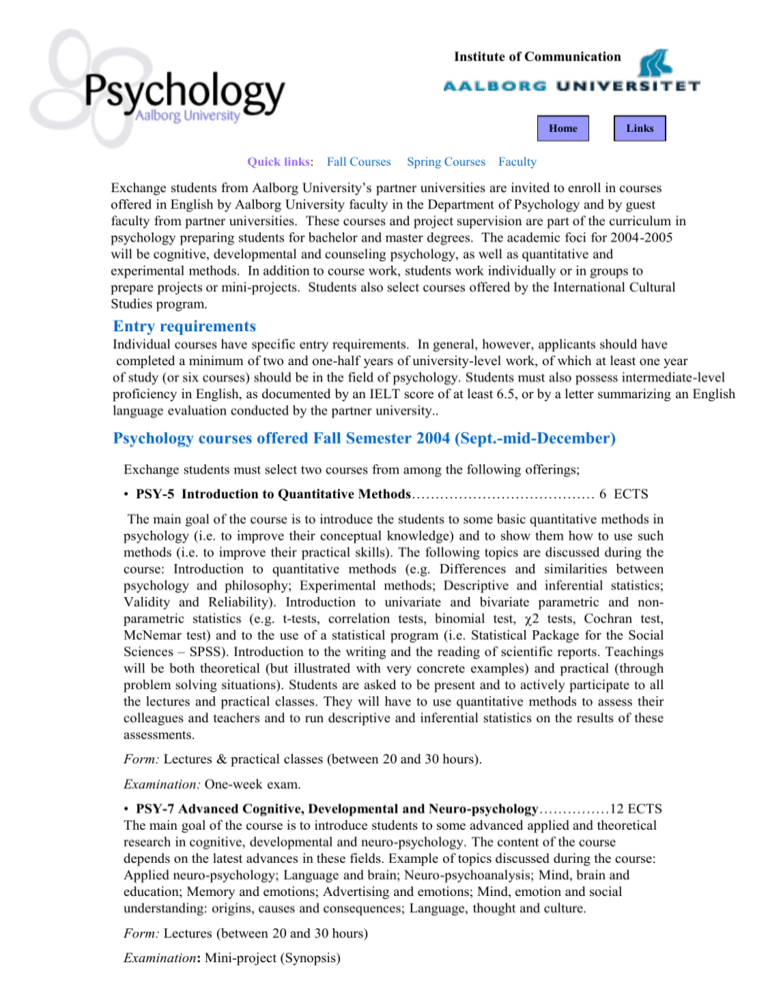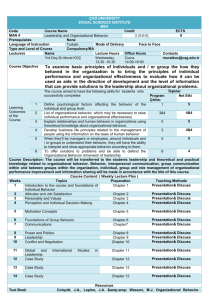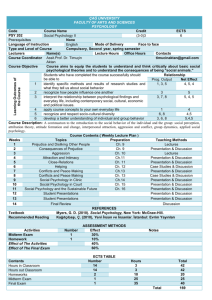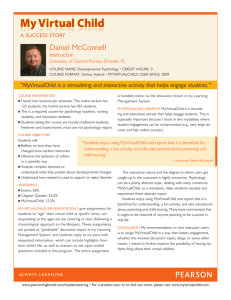PowerPoint-præsentation
advertisement

Institute of Communication Home Quick links: Fall Courses Links Spring Courses Faculty Exchange students from Aalborg University’s partner universities are invited to enroll in courses offered in English by Aalborg University faculty in the Department of Psychology and by guest faculty from partner universities. These courses and project supervision are part of the curriculum in psychology preparing students for bachelor and master degrees. The academic foci for 2004-2005 will be cognitive, developmental and counseling psychology, as well as quantitative and experimental methods. In addition to course work, students work individually or in groups to prepare projects or mini-projects. Students also select courses offered by the International Cultural Studies program. Entry requirements Individual courses have specific entry requirements. In general, however, applicants should have completed a minimum of two and one-half years of university-level work, of which at least one year of study (or six courses) should be in the field of psychology. Students must also possess intermediate-level proficiency in English, as documented by an IELT score of at least 6.5, or by a letter summarizing an English language evaluation conducted by the partner university.. Psychology courses offered Fall Semester 2004 (Sept.-mid-December) Exchange students must select two courses from among the following offerings; • PSY-5 Introduction to Quantitative Methods………………………………… 6 ECTS The main goal of the course is to introduce the students to some basic quantitative methods in psychology (i.e. to improve their conceptual knowledge) and to show them how to use such methods (i.e. to improve their practical skills). The following topics are discussed during the course: Introduction to quantitative methods (e.g. Differences and similarities between psychology and philosophy; Experimental methods; Descriptive and inferential statistics; Validity and Reliability). Introduction to univariate and bivariate parametric and nonparametric statistics (e.g. t-tests, correlation tests, binomial test, c2 tests, Cochran test, McNemar test) and to the use of a statistical program (i.e. Statistical Package for the Social Sciences – SPSS). Introduction to the writing and the reading of scientific reports. Teachings will be both theoretical (but illustrated with very concrete examples) and practical (through problem solving situations). Students are asked to be present and to actively participate to all the lectures and practical classes. They will have to use quantitative methods to assess their colleagues and teachers and to run descriptive and inferential statistics on the results of these assessments. Form: Lectures & practical classes (between 20 and 30 hours). Examination: One-week exam. • PSY-7 Advanced Cognitive, Developmental and Neuro-psychology……………12 ECTS The main goal of the course is to introduce students to some advanced applied and theoretical research in cognitive, developmental and neuro-psychology. The content of the course depends on the latest advances in these fields. Example of topics discussed during the course: Applied neuro-psychology; Language and brain; Neuro-psychoanalysis; Mind, brain and education; Memory and emotions; Advertising and emotions; Mind, emotion and social understanding: origins, causes and consequences; Language, thought and culture. Form: Lectures (between 20 and 30 hours) Examination: Mini-project (Synopsis) Institute of Communication Home Links •Psy-7 Counseling Practicum………………………………………………………………6 ECTS In this practicum students will learn to perform the following counseling skills: Observational, attending, feedback, questioning, reflecting feeling and meaning, note taking and report writing; conceptualisation of the problem and ability to encourage movement on the part of the client. Students will also learn to Recognize differences between clients’ problems/culture; will be introduced to three major theoretical approaches to psychotherapy, and they will learn the social history interviewing technique as an example of information gathering. Form: This class will be conducted in a workshop format over a period of one month. Students will conduct Four (4) 30-minute videotaped simulated counseling sesssions with a parat from the class. Examination: Combination of written papers and performance in counseling sessions. Psychology courses offered Spring Semester 2005 (Feb. 1 – June 30) Students must choose one of the following courses and write a problem-based project on that topic. •PSY-2 Developmental Psychology…………………………………………………………18 ECTS The main goal of this course is to introduce the students to some classical and recent scientific studies about psychological development. Examples of topics discussed during the course: Epistemological issues in developmental psychology; language development; memory development; intelligence development; personality and self development; social development; mind development; consciousness development; life span development; typical and non-typical development and individual differences. Form: Lectures and project tutorial sessions Examination: Project report and oral exam •PSY-8 Advanced psychological assessment ……………………………………………….18 ECTS The course has two main goals. The first goal is to introduce the students to some assessment methods used in cognitive, developmental and neuro-psychology. The second goal is to help the students to use such instruments in the context of an empirical investigation (i.e. their project). The course is divided into five workshops. During the first workshop, students will have introductive lectures on assessment methods in cognitive, developmental and neuro-psychology. A brainstorming will follow on the possible use of some cognitive, developmental and neuro-psychological instruments in the context of the student’s project. During the second workshop, each group of students will present the theoretical background of their project (i.e. theoretical questions or hypotheses) and the theory of the instruments that they are planning to use in their project. During the third and the fourth workshops, each group of students will present the method of their project (i.e. operational questions and hypotheses, research design, participants, instruments, measures) and they will assess their colleagues and teachers with the instruments that there are planning to use during their research (i.e. piloting). Finally, during the last workshop, each group of students will present the results of their research and their first interpretations. During each workshop, the students will get feedbacks not only from the teachers but also from their colleagues. The students are asked to be present and to actively participate to all the workshops and to examine real subjects (the exact number of subjects to be examined will be discussed with the teachers). Form: Lectures and workshops (between 30 and 40 hours) Examination: Project report and oral exam Core Faculty These members of the faculty will teach courses, supervise projects and evaluate students’ work: •Francisco Pons •Tia Hansen • Kristine Jensen de Lopez • Jens Kvorning • Ole Michael Spaten • Jøern Ry Hansen • Nicolai Jørgensgaard Graakjær • Christian Andersen • Jens Riis. •Claus Haugaard Jacobsen •Louise Jackson (visiting faculty, Bemidji State University, USA) Coordinator To request additional information about the program, contact Dr. Francisco Pons Department of Psychology Aalborg University Kroghstræde 3 DK-9220 Aalborg Oest Denmark Phone: +45 9635 7265 Fax: +45 9815 9434 Email: pons@hum.aau.dk Website: www.hum.aau.dk/psychology (under construction) Home Linls International Cultural Studies Courses and Requirements In addition to the courses and examinations offered in psychology, students must meet the following requirements: •They must enroll in one course taught in French, German or Spanish, if that is their native language •They must enroll in either Danish language or Introduction to Scandinavia classes •The minimum registration per semester is 26 ECTS credits; the maximum registration is 34 ECTS ICS Courses The International Cultural Studies Program offers courses in Danish, French, German and Spanish. You will find a list of these courses on the ICS website at www.hum.aau.dk/ics/courses The course listing is updated approximately one month before the beginning of the semester. Danish Language and Introduction to Scandinavia Classes You will find information about the Danish language course at http://www.cfl.hum.aau.dk/aauls/index.htm The website for Introduction to Scandinavia is located at www.hum.aau.dk/iscan You can focus your ethnographic study or research essay on a topic relating to developmental or counseling psychology, with prior approval of the psychology program coordinator. Practical Information Information about costs, application procedures and deadlines, housing, and visas can be found on the ICS website under practical information.





